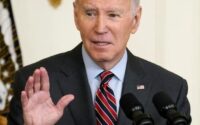Lagarde Says ‘Mild Recession’ Won’t Tame Inflation: ECB Update
(Bloomberg) — European Central Bank President Christine Lagarde warned that a “mild recession” is possible but that it wouldn’t be sufficient in itself to stem soaring prices.
Most Read from Bloomberg
Speaking a week after the ECB’s second straight 75 basis-point hike in borrowing costs, and as fears mount that the energy crisis will drag down output in the 19-nation euro zone, Lagarde said “we don’t believe that that recession will be able to tame inflation.”
While a contraction isn’t her “baseline” scenario, Lagarde’s Latvian colleague, Martins Kazaks, said he expects one in the coming months. Executive Board member Fabio Panetta, meanwhile, warned about the economic risks of rapid rate rises.
The comments are part of a raft of public appearances by ECB officials, as investors and analysts ponder the twin challenges of record price growth and a likely economic downturn, due largely to Russia’s invasion of Ukraine.
Seven of the Governing Council’s 25 members spoke on Thursday, days after data showed consumer prices surged 10.7% in October — more than anticipated and more five times the official target. The focus is now on what action will be taken next month at the final policy meeting of 2022, with hawks and doves alike agreeing that further hikes are needed.
It’s not just rates, which were doubled to 1.5% last month in the most aggressive monetary-tightening cycle in the ECB’s history but still lag behind those in the US. Officials are also debating how to shrink the roughly €5 trillion ($4.9 trillion) of bonds purchased as stimulus during recent crises. The plan is for December’s meeting to agree on that process, known as quantitative tightening.
Key Developments
-
ECB’s Makhlouf Says Too Early to Specify Size of Next Rate Hike
-
Euro Zone’s Factory Downturn Intensifies on Record Inflation
-
ECB Still Has a Long Way to Go on Rates, Nagel and De Cos Say
Click TECO for more of today’s main economic news. See BECO for analysis from Bloomberg Economics and click here to subscribe to our New Economy Daily newsletter.
Portugal’s Centeno (4:05 p.m.)
The ECB has raised interest rates to much nearer the level that neither stimulates nor constrains the economy, according to Governing Council member Mario Centeno.
But while some of his colleagues on the Governing Council have focused on the so-called neutral rate, Centeno said the key at the moment is for inflation to reach its peak — likely in the first quarter.
After that, he told the Bloomberg Portugal Capital Markets Forum in Lisbon on Thursday, monetary policy will become easier and more predictable.
Centeno said the war, not rate hikes, are the driving recession risks, and that shallow recessions “are very difficult to engineer.” He said a severe downturn can still be avoided but it’s important not to let price expectations become unmoored.
“We really need to act in order not to de-anchor inflation expectations in the medium term,” he said.
Spain’s De Cos (1:20 p.m.)
European banks should remain prudent and increase their resilience in anticipation of an economic slowdown, according to European Central Bank Governing Council member Pablo Hernandez de Cos.
While lenders are seeing their profits rise on the back of higher rates, financial institutions should plan for slower activity increasing the stock of bad loans, de Cos told an event in Madrid.
Italy’s Visco (12 p.m.)
Italian central bank Governor Ignazio Visco said the 3% peak of the ECB rate-hiking cycle priced in currently by markets is “a possibility.”
“This is in the range of the rates that we may may reach,” Visco told an online event Despite analysts considering the ECB to be behind the curve in tackling record inflation, he said he doesn’t think officials acted too late.
“I don’t think that we started late,” he said. “Even in September, we still were observing core inflation much below our objectives.”
The Federal Reserve began raising rates earlier than the ECB and has been more aggressive. Visco said he doesn’t think “we should expect really to react to the way the Fed has done.”
Discussing Italy’s borrowing costs, Visco said the spread over German bonds “is still too high.”
Portugal’s Centeno (9:30 a.m.)
Inflation that’s “too high for a long time,” even when driven by supply-side factors, needs to be “attacked” so ECB policy doesn’t lose credibility, Governing Council member Mario Centeno said in an interview with Portuguese newspaper Publico.
“The policy we’re defining doesn’t have the objective of controlling inflation tomorrow or next month,” he said. “The objective is to control inflation in the medium-term. That’s what is in the ECB’s mandate.”
Centeno, who also heads the Bank of Portugal, said other factors contributing to inflation include demand, as household and companies deploy large pandemic-era savings and the jobs market remains strong.
“We can expect that when inflation reaches a peak, and the expectations are that this may happen in the fourth quarter of this year, a very significant degree of predictability about monetary policy will be gained.”
Bundesbank’s Nagel (9:20 a.m.)
Bundesbank President Joachim Nagel said that while political pressure may mount as the ECB continues to tighten monetary policy, this shouldn’t cause it to hold back from further rate increases.
“Political pressure might increase over time as long as we’re in this process of hiking rates,” the ECB Governing Council member told an event in Madrid. “We shouldn’t refrain from further rate hikes.”
While acknowledging a need for more increases, he said the ECB had embarked on a journey and that he wouldn’t speculate where it will end.
The euro zone is in a much better position than after the financial crisis, according to Nagel, who said he doesn’t expect a hard landing for the continent next year.
Discussing future reductions in the ECB’s balance sheet, Nagel said the process should be “credible.”
So-called quantitative tightening should be done smoothly without harming markets, he said, adding that one way of proceeding would be to not replace maturing assets.
ECB’s Lagarde (9:05 a.m.)
Lagarde also said officials must be attentive to the knock-on effects of the rapid interest-rate increases being enacted by the Federal Reserve.
“We have to be mindful of each other and we have to be attentive to potential spillovers and spill backs, as I think the Fed is also mindful of,” she told a conference in Riga, Latvia, the day after the Fed’s latest three-quarter-point hike.
“Each of us, just like the ECB, have our respective mandate, and while we have to factor in such elements like the Fed monetary-policy decisions and other elements of an international nature that will help us determine the best monetary policy, we’re not alike and we can’t progress at the same pace, and the same diagnosis of our economies.”
ECB’s Panetta (9 a.m.)
ECB Executive Board member Fabio Panetta cautioned against unintended consequences as officials raise rates rapidly.
Speaking at the ECB’s Money Market Conference, Panetta said the direction of monetary policy is clear and a further “adjustment” is warranted to keep inflation expectations anchored and stave off second-round effects. But he said the calibration of the ECB’s stance shouldn’t rely on a “one-sided view” of risks.
“We will need to carefully consider the resilience of our economy, the implications of global monetary spillovers, and emerging threats to financial stability,” he said. “Let’s therefore mind the step in adjusting our monetary policy, so we can proceed steadily through the current shocks and bring the economy back to price stability and solid growth.”
Latvia’s Kazaks (8:50 a.m.)
Rate hikes will have to continue into 2023, according to ECB Governing Council member Kazaks.
“It’s clear that interest rates will need to rise much higher to bring inflation down to the target of 2% over medium term,” he said at the opening of a conference in Riga. “There’s no need to pause at the turn of the year. The rate increases must continue into the next year — until inflation, especially core inflation, shows a visible slowdown.”
That’s despite the growing risks of an economic downturn in Europe.
“In my view, recession in the euro area is a baseline scenario, but so far it’s likely to be relatively shallow and brief,” Kazaks said. “And hence insufficient to break the backbone of inflation persistence.”
Latvia’s Kazaks (6:50 a.m.)
The ECB must still lift borrowing costs “significantly” to tackle a record surge in prices, even with the euro zone likely to slip into a recession, according to Governing Council member Martins Kazaks.
“Interest rates will still rise significantly,” Kazaks said. “Of course the uncertainty is very high, especially in relation to the war in Ukraine. Other central banks are also raising interest rates to slow inflation.”
Kazaks warned that loans are set to get costlier still — even after the ECB completed back-to-back rate hikes of 75 basis points.
“For borrowers where euribor is important, that will become more expensive,” he told Latvian TV channel LNT.
–With assistance from Joao Lima, James Regan, Alonso Soto, Bryce Baschuk and Flavia Rotondi.
Most Read from Bloomberg Businessweek
©2022 Bloomberg L.P.
[ad_2]
Source link


